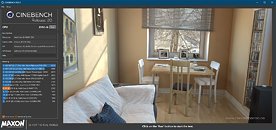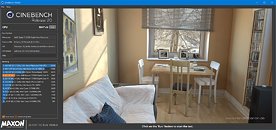Tuesday, March 5th 2019
Maxon Releases Cinebench R20 Benchmark
Maxon Tuesday unveiled its Cinebench R20 benchmark designed to test CPU performance at photorealistic rendering using the company's Cinema 4D R20 technology. The benchmark runs on any PC with at least 4 GB of memory and SSE3 instruction-set support, although it can scale across any number of cores, memory, and supports exotic new instruction-sets such as AVX2. Maxon describes Cinebench R20 as using four times the memory, and eight times the CPU computational power as Cinebench R15. The benchmark implements Intel Embree ray-tracing engine. Maxon is distributing Cinebench R20 exclusively through the Microsoft Store on the Windows platform.
Unlike its predecessor, Cinebench R20 lacks a GPU test. The CPU test scales by the number of CPU cores and SMT units available. It consists of a tiled rendering of a studio apartment living room scene by Render Baron, which includes ray-traced elements, high resolution textures, illumination, and reflections. The number of logical processors available determines the number of rendering instances. The benchmark does indeed have a large memory footprint, and rewards HTT or SMT and high clock-speeds, as our own quick test shows. A 4-core/8-thread Core i7-7700K beats our Core i5-9400F 6-core/6-thread processor.
Update (11th March): We have removed the portable version download at Maxon's request.DOWNLOAD: Maxon Cinebench R20 (Microsoft Store)
Unlike its predecessor, Cinebench R20 lacks a GPU test. The CPU test scales by the number of CPU cores and SMT units available. It consists of a tiled rendering of a studio apartment living room scene by Render Baron, which includes ray-traced elements, high resolution textures, illumination, and reflections. The number of logical processors available determines the number of rendering instances. The benchmark does indeed have a large memory footprint, and rewards HTT or SMT and high clock-speeds, as our own quick test shows. A 4-core/8-thread Core i7-7700K beats our Core i5-9400F 6-core/6-thread processor.
Update (11th March): We have removed the portable version download at Maxon's request.DOWNLOAD: Maxon Cinebench R20 (Microsoft Store)


80 Comments on Maxon Releases Cinebench R20 Benchmark
CPU Multi Score: 284 cb.
CPU Single Score: 80 cb.
MP Ratio: 3.56 x
Cinebench R20 download taken offline after legal threat from Maxon
My main computer is the one with the 2600X and GTX 1070.
[ICODE]Though we strongly feel that this is a community tool which belongs in the public domain we obviously totally need to respect what the publisher deems appropriate for them. [/ICODE]
A private company writes a program. They own it. WTF is a "community tool"?
For the same reason I was shocked a portable version appeared on TPU and received an ovation. TPU basically broke the copyright law by editing the files. This is enough for a legal action.
Once the genie is out of the bottle, it cannot be put back in.
Even if G3D and TPU and any other news outlets are taking their non-UWP versions offline, the files will still exist. It will spread through forums, it will spread through P2P, it will spread to everyone anyway.
Maxxon should get off their high horse and and just offer it officially as a normal download.
Who wants to get from Microsoft Store, power to them.
That being said....
Maxon can't close down the Internet, but they do what they can to protect their property.
There's no "stealing" here of any kind.
Stop smoking whatever you were smoking 38 minutes ago.
Software distributed throught MS Store is, if not stated differently, covered by their standard license terms:
www.microsoft.com/en-us/servicesagreement/#STANDARDAPPLICATIONLICENSETERMS
"
You may not:
a. Work around any technical limitations in the application.
b. Reverse engineer, decompile, or disassemble the application, except and only to the extent that applicable law expressly permits, despite this limitation.
c. Make more copies of the application than specified in this agreement or allowed by applicable law, despite this limitation.
d. Publish or otherwise make the application available for others to copy.
e. Rent, lease, or lend the application.
f. Transfer the application or this agreement to any third party.
"
I've underlined the parts that are violated by making and distributing a portable version without Maxon's permission.
Even tho they are right- they still getting bed publicity now, there was no need for that.
Software companies don't f.. around when license terms are violated.
A few major sites have already dropped their "alternative" Cinebench downloads. TPU is still providing a portable version.
And this is happening a few days after we had a discussion here about TPU stance on piracy.
Now, rendering is a task of running a ray tracing method many times independently. These runs can be done in parallel, as you said.
But the original issue was about poor HT effectiveness in this benchmark. I won't really comment on whether it's actually that bad (there's not enough data yet). But I wouldn't be surprised.
Remember how HT (SMT) works. A core in your CPU can hold and execute 2 processes at the same time... up to a point when they need a core element that's singular (e.g. ALU).
Some tasks leave a lot of computation potential unused (because the CPU spends more time on just working with data and communicating outside).
Ray tracing is very intense computationally.
I've seen a few tests showing that rendering doesn't benefit from HT as much as some other applications do.
Here's an example (quite extreme, as the site name suggests):
www.extremetech.com/computing/133121-maximized-performance-comparing-the-effects-of-hyper-threading-software-updates
You should be able to find a more recent one to check if things improved drastically since 2012 (but they haven't ;-)).
Okay. I'm done.
Unplugging my PC's, throwing them out of the window.
No more software, no more hardware, no more internet for me.
Time to dust off that Stradivarius... and restart practicing on it.